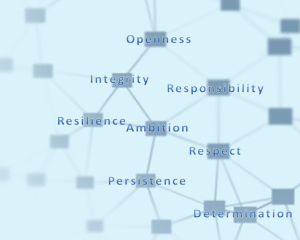Learning Character: Responsibility
September 25, 2016 - 5 minutes readLast year, when a group of teachers and parents came together to determine our school goal, we agreed Learning Character – attributes helpful for students’ success as learners – was essential. We did not quite agree on what those attributes should be.
A number of characteristics were discussed and we settled on four – Responsibility, Openness, Ambition and Resilience. While there were some strong thoughts on which should be the four, compromise was made easier because character traits are often broad terms that are either strongly associated with other aspects of character or  even encompass them. For example, while resilience and perseverance have quite different definitions, they are strongly associated with each other. Resilience made it in; perseverance did not.
even encompass them. For example, while resilience and perseverance have quite different definitions, they are strongly associated with each other. Resilience made it in; perseverance did not.
Being “responsible” is also associated with numerous other traits. The risk then is that we use terms with students that mean many things to many people and thus despite everyone having their own clear sense of what the word means, the word can still seem vague.
To simplify, at BICS, responsibility is referred to as the things we take care of and how well we take care of them. We may have many responsibilities, but what matters is how well we take care of them.
The word can be broken down even further for students, with varying emphasis depending on developmental readiness. Three categories that help people become aware of their ever-increasing responsibilities include:
• responsibilities to self; brushing teeth, positive self-talk, learning
• responsibilities to others; being safe, fair and kind
• responsibilities to the more than human world; ethical decision making with respect to the environment, non-human animals, etc.
With respect to responsibilities to self, it is hard to overstate the importance of executive functioning and self-regulation. Harvard University’s Center on the Developing Child notes, “Just as an air traffic control system at a busy airport safely manages the arrivals and departures of many aircraft on multiple runways, the brain needs this skill set to filter distractions, prioritize tasks, set and achieve goals, and control impulses.” Students can be helped in each of these areas, but in a busy learning environment with dozens of other members, independence is the goal and is critical to success.
For years BICS staff and students have been immersed in the language of self-regulation: of students identifying their state of mind and determining whether this state matches their environment and what they need to do in that environment. Beyond identifying, self-regulation also includes implementing strategies to either up-regulate (stimulate) or down-regulate (calm down) depending on the requirement of the task. We all do this, whether it is splashing water on our face in the morning to wake-up or reading at night to prepare for sleep. Beyond the major transitions from a sleep state to awake, it is critical throughout the day considering the many transitions students have: bus to playground, playground to quiet classroom activity, quiet classroom activity to group work, group work to research, research to PE, and so on.
Executive functioning is also foundational for learning. At a recent professional learning day, BICS Staff had a presentation from Occupational Therapist Anne Wilson who shared some of the work of Sarah Ward and Kristen Jacobsen as well has her own insights. The presentation focused largely on task management, identifying and visualizing the steps needed to complete tasks, and time management, becoming aware of the time needed (and taken) to complete a task. The BICS PAC Parent Education Committee is offering a parent presentation, also kindly led by Anne Wilson, on October 4th which will offer more information as to what executive functioning looks like at home. (Click here to learn more.)
With our school’s focus on “Responsibility” as part of learning character, it is essential that we are clear in what is meant by responsibility including what responsibilities students have and also what strategies they can utilize to be responsible. In doing so, we can support and expect students to not only identify the things they must do and take care of but also set a high standard for themselves to take care of those things as well as they can. Related, then, to responsibility, is ambition, another aspect of ROAR and a subject for another blog post.
Recent Comments